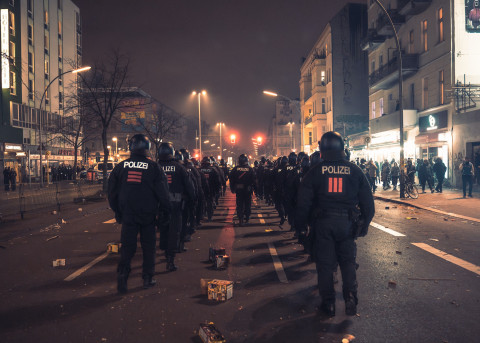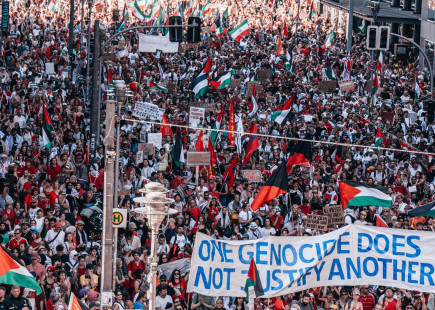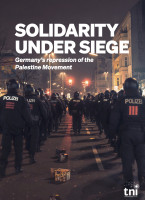Germany’s Crackdown on Palestine Solidarity Solidarity under Siege Series: Introduction
Regions
Since 7 October 2023, Germany’s unabating support for Israel’s genocide in Gaza is mirrored by a sweeping crackdown on Palestine solidarity at home. Over decades, authorities have set up a legal-political architecture that intentionally conflates anti-Zionism with antisemitism and can easily be instrumentalised to shut down any criticism of Israel. The state has responded to such criticism with lawfare, heavy policing, violence, censorship, deplatforming, as well as economic pressure against activists and the instrumentalisation of migration and asylum law. It was aided by most of the media and even parts of the NGO system and the political left. Together, these measures illustrate the emergence of a repressive infrastructure in Germany which criminalises almost any effective form of solidarity with Palestine and threatens broader civil liberties.

Faisal Yassin (@baghdad.stateofmind)
From Staatsräson to Street Control
On 19 October 2023, when Israel’s military onslaught had already killed close to 3,500 people in Gaza,10 the Strip’s only cancer hospital was on the verge of shutting down. By that time, Israel’s Defence Minister Yoav Gallant had publicly ordered a ‘complete siege’ of Gaza, declaring ‘there will be no electricity, no food, no fuel, everything is closed’ – and referred to Palestinians as ‘human animals’.11 Still, after committing to full solidarity in what was already becoming a genocidal onslaught, Germany’s former Chancellor Olaf Scholz declared in parliament that the country would show ‘a clear edge’ against antisemitism and ‘the glorification of violence’.12 This ‘edge’ had already included a blanket ban on anti-Israel protests in Berlin and a violent crackdown on any form of solidarity with Palestinians – and that was just the start. Subsequently, the German government entrenched what the former Chancellor Angela Merkel termed its ‘Staatsräson’, or raison d’état – namely unconditional support for Israel. This doctrine has since been weaponised in Germany against domestic dissent, as the country provides arms used in a genocide abroad and criminalises those who oppose it at home.
Palestinian-US lawyer Noura Erakat’s ‘boomerang’ analysis that describes the United States (US) applies equally to Germany;13 what we have seen since October 2023 is Aimé Césaire’s ‘boomerang’ coming back in full force from the colony to the metropole. Germany’s support for Israel’s apartheid regime and war crimes abroad is translated into repressive policies, mass surveillance, police brutality, and a shrinking space for free expression at home. Germany is not merely absorbing this violence, but is refining, institutionalising, and exporting it. The country has become a laboratory for the criminalisation of solidarity with Palestine, testing how far it can go in suppressing free speech, banning protest, and bending the constitutional framework until it is almost unrecognisable. What happens in Berlin today is becoming the pattern for other countries tomorrow.
Globally, the Palestinian cause has become a lightning rod for repression. In 2024 alone, according to the international non-government organisation (NGO) Civicus, it accounted for over 10% of all documented restrictions on free speech worldwide.14 But Germany’s repression stands out in its scale and intensity: The Civic Space Report 2025 by the European Civic Forum singles out Germany as one of the most repressive EU Countries when it comes to Palestine advocacy15, and the European Legal Support Centre’s Index of Repression has documented more than 700 incidents in Germany since 2019 (most of these since 7 October 2023), affecting thousands across a broad range of the population.16
Central to the repression of the Palestinian solidarity movement is the deliberate conflation of antisemitism and anti-Zionism. Germany’s historic responsibility for the Holocaust (or Shoah) is routinely used to justify another genocide and the repression of those who try to stop it. Critics of Israel, many of them themselves Jewish, are labelled as antisemitic and the Palestinians who mourn their dead and demand justice are cast as threats to public order. Seeking out supposed antisemites might soon be conducted with the help of Artificial Intelligence (AI).17 Yet the real drivers of Germany’s alliance with Israel are less ethical than material: Germany’s foreign policy aligns with US geostrategic interests, and arms companies like Rheinmetall have seen their profits rise by over 2,000% in a decade.18 As James Baldwin wrote in 1979: ‘The state of Israel was not created for the salvation of the Jews; it was created for the salvation of Western interests’.19

Faisal Yassin (@baghdad.stateofmind)
The Infrastructure of Repression
"We felt like we were dealing with settler soldiers, colonial soldiers, but with German clothes. The beginning after the 7 October has been completely about misconceptions and about reproducing images of us as terrorists, as antisemites. Before 7 October we were potential antisemites. After 7 October we were antisemites. Before 7 October, we were potential terrorists. After 7 October we were terrorists. So, this is the kind of collective punishment that migrants and Palestinians experience.
I started feeling personally that all those police who raid our house – that’s only gangs. The use of force, excessive force, and violence against protesters has been extraordinary and overwhelming and also illegitimate. And it's not just about the brutality, but it also shows the kind of legitimacy the police have to actually practise such brutality without any accountability.
And that felt extremely dangerous. As a father, I felt like I might not be able to protect my daughters, and I might be the next one who is actually imprisoned with my daughters. Many families who have kids started to be very scared to go demonstrate on anything to do with Palestine, because of the extreme violence and brutality and the way that our areas became very militarised. As if we are actually dealing with checkpoints everywhere. German police have been stopping and interrogating Palestinians. They’re demanding IDs from people of colour, but not from people who are white. And it became increasingly accepted, and this kind of acceptance is not talked about, that it is actually fine to police and racially profile everyone who’s not white."
- Majed Abusalama, Founder of Palestine Speaks
The past two years have clearly shown the domestic costs in Germany of that salvation. There have been bans on demonstrations, police violence, mass arrests, loss of employment, academic suspensions, bank account closures, deportation orders, surveillance, censorship, and threats to legal residence.20 Together, these measures illustrate the emergence of a repressive infrastructure in Germany, which criminalises almost any effective form of solidarity with Palestine and threatens broader civil liberties.
This crackdown is not enforced by state power alone. Media outlets play a direct role in manufacturing consent for a genocidal war by consistently minimising the genocide in Gaza and the violence inflicted upon Palestinians. Domestically, they have uncritically echoed political and police narratives, dismissing or even inciting violence against the anti-genocide movement and ignoring the rapidly shrinking space of civil society. Liberal civil society actors, for their part, have self-policed their members, disinvited Palestinian speakers, cancelled events, and remained silent in the face of repression. Even sectors of the German left and social movements, fearing reputational damage or funding cuts, have failed to resist Germany’s authoritarian shift. Worse, in many cases they have actively enabled it.
The crackdown has not only targeted the movement in support of Palestine, but has served to test a broader transformation towards authoritarianism, particularly in relation to Germany’s migration policy. Under the pretext of combating antisemitism and extremism, and in a general climate of increasingly deadly and harmful migration policies, immigration law has also become a tool of political control. The state has refused visas, effected deportations or blocked people’s naturalisation for such minor issues as social media posts or attending protests. Residency status, citizenship, and asylum rights are now contingent on ideological conformity. While state actors continue to single out rising antisemitism, other forms of racism, particularly Islamophobia, have surged, with people paying with their health and lives. The 2025 Grundrechte-Report (Basic Rights Report), a civil society alternative to the German government’s annual report on the protection of the constitution, states that ‘[the] exercise of civil liberties is being offensively obstructed or prohibited with unprecedented intensity’. It goes on to emphasise that migrants are most affected by this obstruction of rights.21
The crackdown is not occurring in a vacuum. It is part of a broader shift towards the hard-right and the securitisation and militarisation of various domains in German and global politics. What we are witnessing is not only complicity in a genocide, but an attempt to remilitarise German society, to redefine dissent as extremism, and to equate liberation movements with Nazism. As the filmmaker Dror Dayan notes: ‘While Germany has never broken away from its Nazi past, it is now equating all its enemies – be it Palestinian freedom fighters or Russia – with its own Nazis. While Germany is propping up its own neo-Nazis in the AfD and CDU, it attempts to sell the world an image of itself as fighting Nazis. It simply lies about who those Nazis are’.22 Police powers have expanded under the guise of public security. Measures tested on the Palestinian solidarity movement may well be extended to other dissenting groups, from environmentalists to anti-militarists. As a recent Junge Welt article put it, ‘the state is warming up for a war-readiness that will target any opposition’.23
"So just that you have an idea of how it is to be a Jew nowadays in Germany, where everybody wishes to protect you by basically silencing you, beating you up, and doing everything they can to make sure you don't feel safe in the public sphere of Germany. And then saying it's all done in the name of anti-Semitism."
- Udi Raz, Member of Jewish Voice for Peace
The consequences are deeply personal. For many Palestinian, Arab, Muslim and anti-Zionist Jewish residents in Germany, daily life has become a climate of violence and fear, as highlighted in the quotes at the start of this introduction. But the genocide has also led to a political awakening for a new generation of activists in Germany, the majority of them migrants, Muslims and/or racialised but a considerable part also white non-Muslim Germans. The threat of being labelled antisemitic has led to a split in almost every movement from climate to anti-racism. The wave of criminalisation, defunding and the broader authoritarian shift has, for now, left the left weaker than before. But it also offers the chance to break from a state-funded, NGO-dominated scene and to become more radical and honest: to call for system change rather than cosmetic reforms, to name capitalism, colonialism and genocide for what they are, and to fight them unapologetically.
And people continue to resist. While the media echo state narratives, ever more Germans are seeing through the official lies. In a May 2025 poll, over 80% of Germans said they believe that Israel’s actions in Gaza are unjustified, up 11 percentage points from March 2024.24 In another poll, 70% rejected German military support to Israel.25 Protests continue, even in the face of police violence. Palestinian voices remain defiant. As the lawyer Nadija Samour reminds us, quoting Gandhi: ‘First they ignore us, then they laugh at us, then they fight us – and then we win’.26
This is the first longread in a series of five based on the report Solidarity under Siege: Germany’s Repression of the Palestine Movement. The report draws on the insights of interviews with seven activists from the Palestinian solidarity movement, including Palestinians and German, Muslim and Jewish people, among other (overlapping) identities, who shared their trust, stories and time with the author. At their request, pseudonyms have been used for some of these activists.

